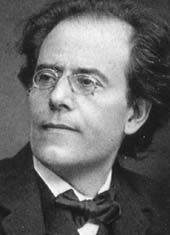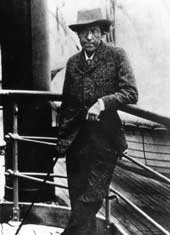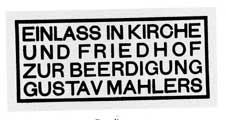| |

|
 | | Gustav Mahler (1860-191)
composer & Alma´s husband no.1
On 7th November 1901 Gustav Mahler, Director of the Royal Opera, met and fell in love with »the most beautiful girl in Vienna«, Alma Schindler, over dinner at the house of Berta Zuckerkandl. The girl, who was nineteen years younger than he, yielded to the courtship, and the wedding took place just a few weeks later. As well as her virginity, Alma sacrificed to her composer husband the most precious thing she had to bestow; her love of music and her own gift as a composer. Henceforth she was prohibited from composing. But for Alma, her marriage to Mahler was also meant doing without the social life she had so loved, for she degenerated into being simply a »mother« and »housewife«. Alma gave her husband two daughters, of whom one, Maria Anna, died young - a stroke of fate from which Mahler was never to recover.
| |  |  |  | 
left: Mahler as music director of the New York Philharmonic orchestra (1909)
right: Mahler on his last journey, from New York to Europe, April 1911 | | |
Alma became the indispensable companion and muse of her husband, who idolized her. The compositions of the latter years of his life are unimaginable without Alma. But Mahler´s Jewish roots are also unmistakeably evident in his music. His revolutionary mix of folkloristic elements, light music and great symphonic form made his symphonies unpalatable for many of his contemporaries. In 1910, Alma´s liberating affair with the young architect Walter Gropius drove Mahler into the hands of Sigmund Freud, to whom he entrusted himself in a session of analysis lasting just four hours. Freud penetrated the essence of the relationship, which was marked by a mutual longing for a father and mother substitute, thereby generating some late happiness which the two lovers were, however, only briefly able to enjoy. Having fallen seriously ill, Mahler died in 1911 and was buried in the grave of his little daughter Maria in Grinzing cemetary in Vienna.
›› read more about Gustav Mahler's funderal (by Paul Stefan)
|  |  | left: Entrance card to
Mahler’s funeral in 1911 | | |
